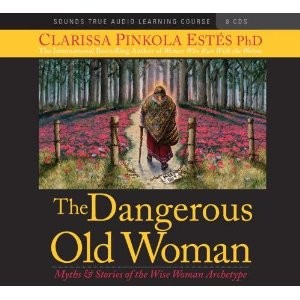When was the last time you sat around a campfire, taking turns, telling or listening to stories? Do you miss that sharing? Is it lost to you, or can you open your heart and find that like an ember, that story and many stories are sitting inside you, ready to be lit afire?
This weekend my name finally made it to the top of the list at the library for the CD set, “The Dangerous Old Woman: Myths & Stories of the Wise Woman Archetype” by Dr. Clarissa Pinkola Estés. I first learned of Dr. Estés through her book, Women Who Run With the Wolves, but I especially enjoy the storytelling on her CD set. If you have any curiosity about the wise woman archetype or simply love stories, I strongly urge you to look into this series. Listening to her work is like being reintroduced to stories around a campfire. So powerful and so rich.
She begins with the fairy tale of Snow White and then goes into depth about its meaning and significance. I won’t spoil the details of her insight and would if I tried, but I will say, what a talented storyteller she is! I became so enchanted and lost in story, that when I awoke from her trance I realized I hadn’t experienced such a feeling in a long time. I remembered how powerful it is to hear story rather than to simply read it or write it. I also recognized how lessons and learnings seem to gel so much better in my brain and in my heart when I hear information tied to a story.
Which got me thinking, why as adults don’t we read fables to one another? Or maybe we exchange stories in a different way, for example, through a TV series or a Youtube video or a 140 character tweet. Regardless of delivery or content, what are the stories we tell ourselves and our children nowadays? What are the modern day fairy tales circulating out there? How has storytelling been cheapened or beautified by the process of globalization? And what is the value of storytelling? Does it still have value? What is it’s purpose? Can stories still offer us life lessons? Can we use stories to motivate others?
Well I am not coming on here to dole out answers nor do I have them all, but I can say with certainty that I need stories to understand, experience and connect to my surroundings, community and myself. Stories are invaluable to me, and yet I do not always praise and honor them. With the fast pace of life I do not often allow myself to tell my story, the kind that comes from deep within my heart. And then it occurs to me, so many of us have buried our stories so deep within us. And, then, because on a daily basis we operate from our minds alone, we lose touch with the heart of our story lines – cutting ourselves off from so many things like our cultural past/present, our highest self and our very life purpose.
Even though some days it may seem like the story is dead within us and the people around us, if we shift our perspective we can see that stories are still alive and thriving and impacting the very way we experience the world. They are not dead but simply need to be rediscovered, nurtured and ultimately transformed in a way that can be shared with others. For those of you who have taken the time to discover and heal and are now ready for the sharing part, you may feel like you have a story stirring in you, ready to come out to the world. So, how are you going to tell it? Is there a right or wrong way? It depends on your goals.
If you want to tell a story to motivate or influence someone, there are some methods to consider. Infuse your story with a little bit of strategy and you can turn your tale into something bigger that may move others into action or that may move someone to share their own story. When we are all sharing our stories, we begin to be with ourselves and with one another in a way that offers true healing, learning and connection.
To help tell your story, click below for the Communicate to Motivate video from Prevention Speaks:
—
Prevention Speaks is a storytelling resource for healthy change in communities that is local (from Wisconsin). This website has a lot of great links and there you can pick up your very own storytelling tool kit.

